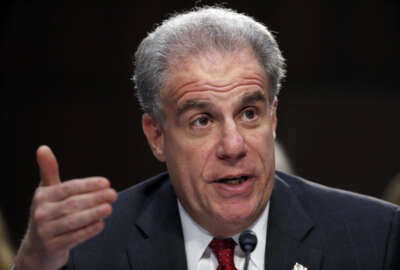

When President Jimmy Carter signed the Inspector General Act on Oct. 12, 1978, he saw the legislation as an olive branch to an American public that was still...
Best listening experience is on Chrome, Firefox or Safari. Subscribe to Federal Drive’s daily audio interviews on Apple Podcasts or PodcastOne.
When President Jimmy Carter signed the Inspector General Act on Oct. 12, 1978, he saw the legislation as an olive branch to an American public that was still reeling from the resignation of President Richard Nixon.
“For him, Watergate was not simply the break-in and the cover-up. It was the abuse of power, the misuse of the IRS and the CIA against domestic enemies,” Stu Eizenstat, the president’s former chief White House domestic policy adviser, said Friday at the Jimmy Carter Presidential Library in Atlanta.
“For him, trust and confidence in government was essential to maintain public support for positive government programs,” he added.

Forty years later, Carter was unable to attend an event honoring the 40th anniversary of the IG Act at his presidential library, but in a statement, he said the inspector general community has excelled at providing government transparency.
“In 1978, I had the honor of signing the Inspector General Act into law. On that occasion, I predicted that the newly-created Inspectors General would be the government’s most important new tool in the fight against fraud and waste. Through your remarkable and relentless efforts since that time, my prediction and my hope has been turned into reality,” Carter said.
Former Sen. George Mitchell (D-Maine) said the IG Act started a wave of “good government legislation,” including the Civil Service Reform Act, which Carter signed just a day later.
“Overall, you have had a profound impact on the U.S. government and the American people. Your independent oversight has revealed numerous instances of fraud, waste abuse and misconduct, all of which have resulted in improvements in federal programs,” Mitchell wrote.
In 1988, Mitchell was one of the original cosponsors of a package of amendments to the IG Act that, among other things, expanded the number of agency inspectors general from a dozen to 57.
“That was really the moment at which what started as an experiment became a foundational government entity, and has developed into what it is today,” said Michael Horowitz, the Justice Department IG and chairman of the Council of Inspectors General on Integrity and Efficiency (CIGIE).
For one, he said IG offices have become much more diverse. Recalling a Washington-based CIGIE event in July, he remembered seeing a “sea of women, of African Americans, of Hispanics” that had gone underrepresented in government service.
“There’s no question in my mind that the diversity … that we see today is a stark contrast to what we would’ve seen if we had a conference 40 years ago. It would have been, with a few minor exceptions, a bunch of old, white men,” Friedman said. “And now, it is entirely different, and I think the [IG] community and government benefits from that.”
Friedman, also a former chairman of the President’s Council on Integrity and Efficiency, the forerunner to CIGIE, said the IG community has kept up with a “sea change” in technology.
“The IG community has not only adapted to the change in technology, it has adopted the change in technology in really amazing ways. We are leading analytics and forensics, and computer security, and doing all sorts of amazing things that simply weren’t even conceived of 40 years ago,” he said.
More recently, colleges and universities have played a leading role in training and recruiting talent.
The John Jay College of Criminal Justice in New York, for example, now offers a master’s degree in public administration with a track devoted to inspector general work.
Richard Relkin, a spokesman for the college, said more than 250 students are currently enrolled in the program, and added that it’s “one of our more popular programs.”
Friedman said these programs have helped created the most-skilled IG workforce in government.
“There is no time in my memory of the past 40 years when the IG community, broadly defined, has been more involved in more high-impact controversial matters than it has today,” he said.
One factor that hasn’t changed over the course of 40 years, however, is the occasional flare-up in tension between the independent OIGs and agency leadership.
In June, then-acting VA Secretary Peter O’Rourke blasted the agency’s IG after it complained about its access to records from the Office of Accountability and Whistleblower Protection.
In a letter, O’Rourke told IG Michael Missal that he was his immediate supervisor, and directed him to “act accordingly.”
To that point, Friedman said OIGs can mend relations with the agency they oversee.
“I think that’s one way of building a bridge with management, getting management to be more responsive to your reports, which is proving to them through your work, through the quality of your work that you should be respected and not feared,” he said.
Copyright © 2025 Federal News Network. All rights reserved. This website is not intended for users located within the European Economic Area.
Jory Heckman is a reporter at Federal News Network covering U.S. Postal Service, IRS, big data and technology issues.
Follow @jheckmanWFED



